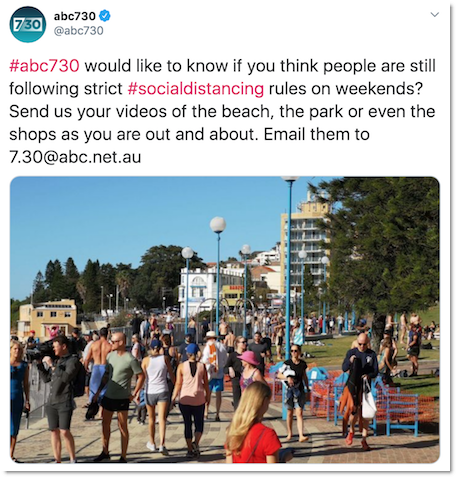
When I popped to the shop to get bread on Sunday morning, it was impossible to not notice the crowds. It could be that the impossibly glorious Sydney weather is just too much to resist. More likely it’s a sign that lockdown camaraderie is seriously on the wane.

With a total of 6713 infections, 83 deaths and single-digit daily increases, it’s hardly surprising that the Australian public’s sense of the COVID-19 threat is shifting back to where it was in February before the numbers spiked.
It’s also a harbinger of the big battles that are brewing and those yet to be recognised.
The fight over schools reopening is becoming fraught; it combines a bunch of eternal flashpoints with parents’ inchoate fear for their children.
As JobKeeper becomes real, the flaws in its design are exposed. Apart from leaving over 1 million vulnerable workers out of its protection, it has several built-in perverse disincentives for businesses to do their best. A universal wage subsidy would have avoided all that, but it was too much of an ideological leap for the Morrison government. As a result, while it will help a lot, it will be arbitrarily unfair.
The early shots in the big war are also being fired. For all the noise, essentially these boil down to variations on a relatively simple question: do we use this unique opportunity, when an externally imposed crisis has thrown all of our operating assumptions out the window, to reimagine and rebuild the structures of our economy and society in a better way? Or do we rush to not just restore the pre-existing balance of power, but also entrench it further by making new laws that compound inequality?
Whether you like my framing of the second alternative depends on whether you believe that inequality already exists for structural reasons, as opposed to it being a reflection of personal worth (see: the prosperity doctrine, much beloved by the Prime Minister).
This dichotomy will play out in numerous fields: tax reform, industrial relations, climate change, water rights, planning laws, deregulation and competition policy. Big business is pushing hard already for the balance to be returned to its favour, and pressing for the tax cuts it has been denied so far.
The Morrison government is giving off all the right signals to its supporters: that it will follow through on its undertaking to unwind all of this COVID expediency as fast as possible and get back to its agenda of delivering small government. In that context, the debt it’s racking up at a historic rate will be locked in the same attic as Tony Abbott’s ghost — not to be mentioned, ever.
That battle will not be easily won, however. While the Liberal Party can continue to pretend to itself that there are two types of unemployed people — those who have lost their jobs recently “through no fault of their own”, and those who were already unemployed and therefore unworthy — too much of the population has been newly exposed to the harshness of our social security system now.
Scott Morrison can tweet that he and Donald Trump agreed on how our “market-led” economies are going to bounce back, but nobody will have missed the point that it wasn’t the market that led Australia to the landing place of potential safety where we now sit. It was a whole of government and country response that had all the features (except the title) of socialism.
That’s ahead of us. Right now, there are big gaps in the response we’ve made. As we start to emerge into the sunlight and contemplate something more than a walk and a takeaway coffee, these gaps will become chasms.
The Virgin Australia collapse represents the problem in miniature; the government is caught between its ideological resistance to bailing out companies, and the unpleasant realities of 16,000 jobs being lost and a return to a Qantas monopoly once more.
A more interesting and global example is that of tenancy. For both residential and commercial tenancies, the government has so far shied away from meaningful intervention. The state governments are legislating eviction moratoriums, but nothing else of substance.
The government’s stance has been this: everyone please just get along. Negotiate in good faith, share the pain, and let’s hope this ends soon. In the real world, that is happening sometimes, and many times not.
It’s not difficult to see the problem: tenant loses their income and can’t maintain their rental payments. Landlord needs the rental income to pay their mortgage. Yes, there are many landlords who can afford the carry; and yes, labour is more worthy than capital. That doesn’t solve the problem though.
A major shopping centre owner recently wrote to all its retail tenants telling them to keep their shops open, because the law says they can, or else they’ll breach their leases. That is harsh, but then so are the consequences of owning a shopping centre that is empty and returning no rent.
It’s not a sufficient answer to say, as the government is, that landlords should skip along to their banks and ask for some relief. The banks aren’t behaving badly (another hidden blessing from the royal commission the government didn’t want) but the best they can do is offer deferral of mortgage repayments. That’s just banking the problem for later.
There is no viable solution to the paralysing of the tenancy market apart from direct government intervention to bankroll it. If the government don’t intervene, the extended recession it’s trying to avoid will be a lot more probable.
It’s understandable that we’re all losing a bit of steam in our push to keep COVID-19 from the door. It’s equally predictable that the government has lost some of its courage as the immediacy of the threat falls away.
But the job, on either front, isn’t done yet, and it’s way too early to fall back to the dismal inaction of the time before all this began.








Funny how the govt has ‘rescued’ foreign owned Rex but not Virgin, because they are foreign owned.
Solomon Lew manages to not pay his rent apparently.
Well said, Michael…thank you for this overview of what we might expect post ‘virus’.
The only solution I can see to the business as usual of the L/NP, is a change of government ASAP…but that isn’t going to happen for at least another two years, if at all, given that the voters think ‘King Sooty’ is wonderful…heaven help us all!
What a short memory some folk have. Bushfire response, sports rorts, climate change denial, M/D water debacle…all still there people!!
It is fraught, Michael. Seems there hundreds of skirmishes are going to be fought out in this battle.
It’s astounding that sharemarkets are still living in bubble-land. There is so much risk and it’s currently priced as if all will be back to normal in 6 months, v shaped recovery or a thin u perhaps. I can only see a very fat bottomed U at best, and perhaps an L shaped non recovery.
As for Coogee, I bloody live here and have walked from home to the beach and back for 25 years. Not for the last two months. The crowds are beyond your worst summer nightmare. People are coming from god knows where, but I’m not allowed to swim at either beach within a K or two of home.
I know I’m very fortunate, but it’s increasingly hard not to walk there wearing a t-shirt saying “go back to where you came from”.
No, I wouldn’t, but tempted. Lucky I don’t own one.
These are very good times for NIMBYs. You may be too too polite to wear such a slogan DB, but a house near Clovelly wasn’t the other day… They had hung out a huge hand painted banner reading “STAY HOME! We live here and we’re surviving!” In other words, “We will decide who comes to this country, and the manner in which they come here!”
Sound familiar?
Why am I seeing a telephoto-lens compressed picture of a beach on Crikey? Cripes, your one isn’t even distorted enough to “prove” its entirely specious point!
Ok I get it that a lazy media loves a visual metaphor, but this is just extreme dishonesty. I see the same images every day now at the start of just about every news bulletin. Anyone would think that we get the virus from the Pacific Ocean.
Anyway, who would want to go for a swim at my local beach, Coogee! To get to the water, you have to pass through as many barriers and security guards as there are on the Israeli/Palestine border. And then get barked at constantly by loudspeakers before being herded off the sand by mounted police. Welcome to lockdown-land, and thanks for setting that up for us #ABC7.30. Leigh, your team are a bunch of creeps.
Get a life, beach-side residents! Just because you live near the ‘water’, doesn’t mean you own the beach. As far as I’m aware, the beaches belong to the ‘Crown’, which means the country and ALL its people regardless where they live.
Wasn’t it this beach-side resident attitude that started the Cronulla riots a few years ago? That is all we need at the moment!!